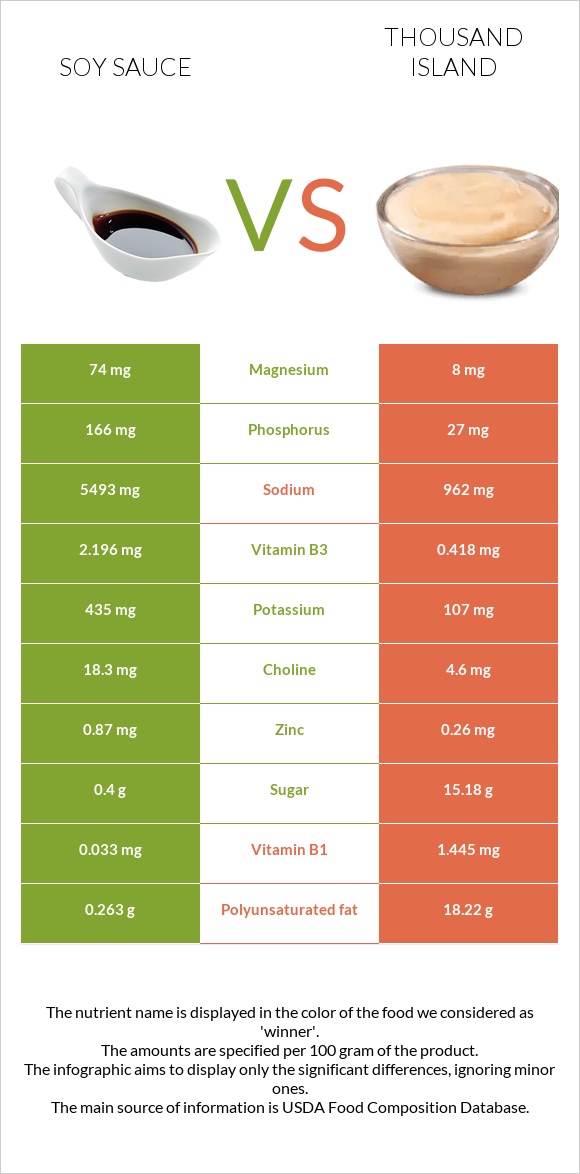Soy sauce vs. Thousand island — In-Depth Nutrition Comparison
Compare
Significant differences between soy sauce and thousand island
- Soy sauce has more manganese, phosphorus, magnesium, vitamin B6, and vitamin B3; however, thousand island is richer in vitamin B1, vitamin K, and vitamin E.
- Soy sauce covers your daily sodium needs 197% more than thousand island.
- Thousand island contains less sodium.
Specific food types used in this comparison are Soy sauce made from soy and wheat (shoyu) and Salad dressing, thousand island, commercial, regular.
Infographic

Infographic link
Mineral Comparison
Mineral comparison score is based on the number of minerals by which one or the other food is richer. The "coverage" charts below show how much of the daily needs can be covered by 300 grams of the food.
| Contains more MagnesiumMagnesium | +825% |
| Contains more CalciumCalcium | +94.1% |
| Contains more PotassiumPotassium | +306.5% |
| Contains more IronIron | +22.9% |
| Contains more CopperCopper | +∞% |
| Contains more ZincZinc | +234.6% |
| Contains more PhosphorusPhosphorus | +514.8% |
| Contains more ManganeseManganese | +2445% |
| Contains less SodiumSodium | -82.5% |
| Contains more SeleniumSelenium | +200% |
Vitamin Comparison
Vitamin comparison score is based on the number of vitamins by which one or the other food is richer. The "coverage" charts below show how much of the daily needs can be covered by 300 grams of the food.
| Contains more Vitamin B2Vitamin B2 | +184.5% |
| Contains more Vitamin B3Vitamin B3 | +425.4% |
| Contains more Vitamin B5Vitamin B5 | +∞% |
| Contains more Vitamin B6Vitamin B6 | +∞% |
| Contains more FolateFolate | +∞% |
| Contains more Vitamin AVitamin A | +∞% |
| Contains more Vitamin EVitamin E | +∞% |
| Contains more Vitamin B1Vitamin B1 | +4278.8% |
| Contains more Vitamin KVitamin K | +∞% |
All nutrients comparison - raw data values
| Nutrient |  |
 |
DV% diff. |
| Sodium | 5493mg | 962mg | 197% |
| Polyunsaturated fat | 0.263g | 18.22g | 120% |
| Vitamin B1 | 0.033mg | 1.445mg | 118% |
| Vitamin K | 0µg | 69.1µg | 58% |
| Fats | 0.57g | 35.06g | 53% |
| Manganese | 1.018mg | 0.04mg | 43% |
| Vitamin E | 0mg | 4mg | 27% |
| Saturated fat | 0.073g | 5.092g | 23% |
| Phosphorus | 166mg | 27mg | 20% |
| Monounsaturated fat | 0.088g | 7.881g | 19% |
| Calories | 53kcal | 379kcal | 16% |
| Magnesium | 74mg | 8mg | 16% |
| Protein | 8.14g | 1.09g | 14% |
| Vitamin B3 | 2.196mg | 0.418mg | 11% |
| Vitamin B6 | 0.148mg | 0mg | 11% |
| Potassium | 435mg | 107mg | 10% |
| Cholesterol | 0mg | 26mg | 9% |
| Vitamin B2 | 0.165mg | 0.058mg | 8% |
| Zinc | 0.87mg | 0.26mg | 6% |
| Vitamin B5 | 0.297mg | 0mg | 6% |
| Copper | 0.043mg | 0mg | 5% |
| Fructose | 0g | 4g | 5% |
| Folate | 14µg | 0µg | 4% |
| Carbs | 4.93g | 14.64g | 3% |
| Iron | 1.45mg | 1.18mg | 3% |
| Calcium | 33mg | 17mg | 2% |
| Vitamin A | 0µg | 14µg | 2% |
| Selenium | 0.5µg | 1.5µg | 2% |
| Choline | 18.3mg | 4.6mg | 2% |
| Net carbs | 4.13g | 13.84g | N/A |
| Sugar | 0.4g | 15.18g | N/A |
| Fiber | 0.8g | 0.8g | 0% |
| Tryptophan | 0.096mg | 0mg | 0% |
| Threonine | 0.271mg | 0mg | 0% |
| Isoleucine | 0.318mg | 0mg | 0% |
| Leucine | 0.537mg | 0mg | 0% |
| Lysine | 0.381mg | 0mg | 0% |
| Methionine | 0.097mg | 0mg | 0% |
| Phenylalanine | 0.353mg | 0mg | 0% |
| Valine | 0.332mg | 0mg | 0% |
| Histidine | 0.174mg | 0mg | 0% |
Macronutrient Comparison
Macronutrient breakdown side-by-side comparison
Protein:
8.14 g
Fats:
0.57 g
Carbs:
4.93 g
Water:
71.15 g
Other:
15.21 g
Protein:
1.09 g
Fats:
35.06 g
Carbs:
14.64 g
Water:
46.51 g
Other:
2.7 g
| Contains more ProteinProtein | +646.8% |
| Contains more WaterWater | +53% |
| Contains more OtherOther | +463.3% |
| Contains more FatsFats | +6050.9% |
| Contains more CarbsCarbs | +197% |
Fat Type Comparison
Fat type breakdown side-by-side comparison
Saturated fat:
Sat. Fat
0.073 g
Monounsaturated fat:
Mono. Fat
0.088 g
Polyunsaturated fat:
Poly. Fat
0.263 g
Saturated fat:
Sat. Fat
5.092 g
Monounsaturated fat:
Mono. Fat
7.881 g
Polyunsaturated fat:
Poly. Fat
18.22 g
| Contains less Sat. FatSaturated fat | -98.6% |
| Contains more Mono. FatMonounsaturated fat | +8855.7% |
| Contains more Poly. FatPolyunsaturated fat | +6827.8% |
Carbohydrate type comparison
Carbohydrate type breakdown side-by-side comparison
Starch:
0 g
Sucrose:
0.1 g
Glucose:
0.3 g
Fructose:
0 g
Lactose:
0 g
Maltose:
0 g
Galactose:
0 g
Starch:
0 g
Sucrose:
6.4 g
Glucose:
4.78 g
Fructose:
4 g
Lactose:
0 g
Maltose:
0 g
Galactose:
0 g
| Contains more SucroseSucrose | +6300% |
| Contains more GlucoseGlucose | +1493.3% |
| Contains more FructoseFructose | +∞% |
~equal in
Starch
~0g
~equal in
Lactose
~0g
~equal in
Maltose
~0g
~equal in
Galactose
~0g




